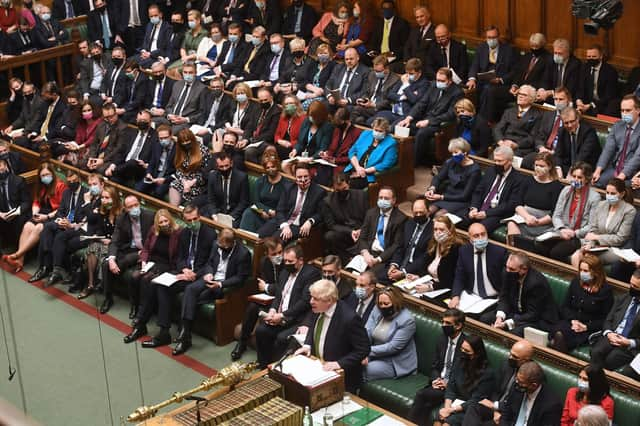Owen Polley: Flip-flopping prime minister can’t be relied on to sort out the Northern Ireland Protocol


After the prime minister performed a characteristic u-turn and withdrew the measure, the DUP leader was careful not to imply that he had been betrayed.
He did not take much trouble, though, to hide his irritation with the Conservatives’ decision.
Advertisement
Hide AdAdvertisement
Hide Ad“I haven’t spoken to the government about this so you will have to ask them for their rationale,” Sir Jeffrey said. “We felt that the amendment offered an opportunity, perhaps for a small number of senior representatives to continue to have a voice at Westminster while we were trying to resolve issues such as the (NI) Protocol.”
If the government had sought a deal with the DUP, it might have asked for its support in agreeing with the EU to retain some trade barriers at the Irish Sea border.
It could have looked for backing for its legacy plans, which the parties in Northern Ireland currently oppose.
And it may even have seen a relaxation of the rules on double-jobbing, which would have benefitted Donaldson significantly, as compensation for a move to introduce Irish language legislation without the consent of the assembly.
But there was no such deal.
Advertisement
Hide AdAdvertisement
Hide AdSo, when Donaldson called on the government to immediately remove the protocol, withdraw its legacy proposals and scrap impending laws on Gaelic, he was pointing out that these measures did not enjoy ‘cross community consent’.
Before the government changed its decision, six parties at Stormont wrote collectively to the prime minister to oppose his plan to allow MLAs to keep their Westminster seats.
They claimed the Northern Ireland Office was departing from its ‘stated position’ that amendments affecting the province would be tabled only where ‘sufficient consensus’ exists.
While Sir Jeffrey performed logical pirouettes to disguise his personal disappointment, the rest of the parties’ reasoning was equally supple.
Advertisement
Hide AdAdvertisement
Hide AdBoris Johnson had responded to their demands, but they were determined to blame the DUP’s gullibility rather than credit the PM for his responsiveness.
It was easy to be cynical about the timing and motives of the original decision on dual-mandates. But the u-turn will do nothing to reassure unionists that Boris Johnson is firmly in charge of a government that knows what it is doing.
While voters were still digesting that news, Liz Truss reportedly extended the deadline for the UK to agree a deal with the EU until the end of February.
Previously, there was an expectation that talks would not be prolonged past January. Before that, the former Brexit negotiator, Lord Frost said it was a matter for the autumn, “one way or another”.
Advertisement
Hide AdAdvertisement
Hide AdDespite the endlessness of this process, Sir Jeffrey Donaldson recently ‘paused’ the DUP’s threat to walk out of the executive over the Irish Sea border, because he thought his party was “on the same page” as Truss.
If there is a bad deal for unionism or the protocol carries on without reform, there will now be no time for decisive action before Stormont is dissolved ahead of the assembly election in May.
The DUP’s attempt to lend urgency to the negotiations will come to nothing. Likewise, the government’s threat to trigger Article 16 will prove hollow.
In other words, exactly what the cynics always predicted.
In the unlikely event that the government does trigger Article 16 before the end of February, how certain can we be that the prime minister will maintain his resolve?
Advertisement
Hide AdAdvertisement
Hide AdThe decision would prompt a hysterical reaction from Brussels, Dublin, Irish nationalists, die-hard remainers and possibly Washington.
More often than not, it seems Boris Johnson simply reverses his policies when he encounters serious opposition.
He planned to block the parliamentary ban on Owen Paterson MP, then immediately changed his mind.
He defended Matt Hancock for breaching Covid regulations, then promptly sacked him.
Advertisement
Hide AdAdvertisement
Hide AdIn contrast to many premier league defences, Johnson even conceded to a Manchester United striker, this time on the issue of free school meals.
The government’s proposals for changes to the protocol remain entirely reasonable.
There is no reason that goods should not flow freely between Great Britain and Northern Ireland, without compromising the single market.
Marks and Spencer and other traders this week outlined another plan to use traceability software to “clearly show that product that moves to Northern Ireland stays in Northern Ireland”.
Advertisement
Hide AdAdvertisement
Hide AdThe EU could resolve the problems with the protocol tomorrow if its real intention were not to punish the UK for Brexit and distance NI from GB.
That Britain is in the right may ultimately make no difference, because the government seems no closer to forcing Brussels to make meaningful concessions.
Even if he were to finally show some resolve, the latest flip-flop suggests that we could not rely on the prime minister to stick to his decision.
——— ———
A message from the Editor:
Thank you for reading this story on our website. While I have your attention, I also have an important request to make of you.
Advertisement
Hide AdAdvertisement
Hide AdWith the coronavirus lockdowns having had a major impact on many of our advertisers — and consequently the revenue we receive — we are more reliant than ever on you taking out a digital subscription.
Subscribe to newsletter.co.uk and enjoy unlimited access to the best Northern Ireland and UK news and information online and on our app. With a digital subscription, you can read more than 5 articles, see fewer ads, enjoy faster load times, and get access to exclusive newsletters and content.
Visit
now to sign up.
Our journalism costs money and we rely on advertising, print and digital revenues to help to support them. By supporting us, we are able to support you in providing trusted, fact-checked content for this website.
Ben Lowry, Editor